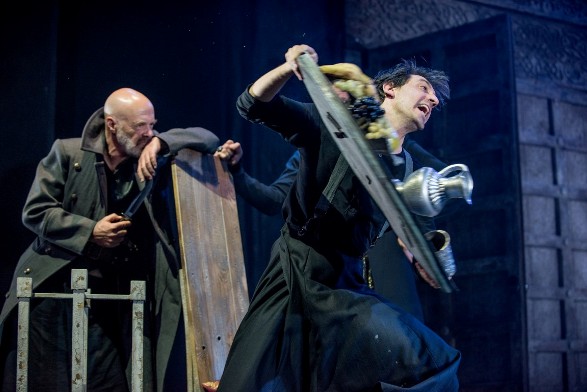Larger than life, the smooth, lust-worthy image of Michelangelo’s David, surrounded by scaffolding, looms over the action onstage in the Gesher Theatre production of King David Report. The play focuses on King David – the myth, the man, and the literary, historical, political, emotional, psychological and moral perspectives of the image-making process – with theatrical flair, wit, humor, and excellent performances. In sharp contrast to the marble icon, playwright Roee Chen and director Yevgeny Arye present us with a protagonist on a quite human scale, the very likeable and relatable Ethan the historian (Alon Friedman).

Ethan has been summoned to the court of King Solomon, where he is presented with an offer he can’t refuse: to write the official history of King David. He will be amply compensated for his labors with free housing and the wages of a minor prophet, and like many a prophet, Ethan is reluctant to take on this task. Based on The King David Report, a novel by Stefan Heym, Roee Chen has written a play that immerses the viewer in Biblical times, merging a neutral modern Hebrew with Biblical quotes and references to create a contemporary feel – it’s almost like entering a time machine. One enters a world in which God’s will is accepted as truth, plain and simple; although understanding God’s will, well, that is a different story…

We are accustomed to think that we live in a particularly image-conscious era, one in which even the relatively anonymous denizens of the planet are image savvy and many of us are well aware of our online presence and its significance. Image is all, especially for celebrities and politicians, the look and spin often more important than fact and actions. Image monitoring was perhaps easier in the days of clay tablets, and yet, even the most casual reader of the Bible will note differences between the books of Samuel, Kings, and Chronicles. Did David and King Saul first meet when David slew Goliath (I Samuel 17)? Or was it when an “evil spirit from the Lord” overtook King Saul and David was brought to the palace where his music brought relief to the troubled King and “Saul sent word to Jesse, Let David remain in my service” (I Samuel 16:22)? How does one interpret these and other inconsistencies, lacunae, and contradictions?
In this critical and humorous look at Biblical events as current events, King Solomon (Miki Leon), concerned that any blight on David’s image and most important any doubt to the legitimacy of David’s ascension to the throne, will cast aspersions on his own legitimacy and authority. Hence the need for an historian. The lines between history, politics and theatre blur as storytellers, and witnesses present different chapters in David’s life, and there are many amusing meta moments of references to theatre and theatre critics.
Director Yevgeny Arye imbues this production with a seductive mixture of flamboyance and restraint, resulting in a mesmerizing, thought provoking show. The set, costumes, and dialogue evoke Biblical times without the oppressive weight of realism, a papier–mâché donkey indicates a journey, the men wear sports jackets over floor-length robes, and witnesses are interviewed by video camera with the large-scale images projected above the stage. This last tool allows the production to span a wide range of impact, encompassing the hyperbolic physicality and parody of theatre styles as expressed by the storytellers, and the intense intimacy of the testimony. Reveling in the freedom of theatre, certain scenes from King David’s life are replayed, each time in a different version: onstage, both are equally valid, present. How does one determine which is true? The gaze of this production is at once epic, comic, critical, and deeply intimate.
The performances are outstanding, each character brings a different tone and color to this marvelously textured play. When the princess Michal (Lilian Roth) shares with Ethan and the audience the private details of her desires, jealousy, humiliation, anger, and pain, one sees subtle nuances of expression on the black and white projected image of her face, the many shades of feeling. Miki Leon and Doron Tavory alternate in the roles of King Solomon and Benaiah his military commander. On the night I saw the play, Leon’s Solomon was a suave politician, while Tavory’s Benaiah was the thug who enabled that calm, confident demeanor. When King Solomon first explains the task ahead to Ethan, the pierced and tatted Benaiah sits playing with his knife, only the barely discernable movement of his eyes indicates that he is listening intently, every sense alert, always ready to strike. Tavory infuses Benaiah with a menacing force and brutality fearsome to contemplate as the protector of the King’s rule and image.

There are more than a few nicks and dents to David’s image by the time the curtain falls, but no more so than one might infer from a critical reading of Biblical texts. A vibrant culture is not afraid to wrestle with mythological figures and endeavor to understand the myth-making process, laugh at its own foibles, pratfalls, pretensions and weaknesses, critique its moral failings, imagine and invent without restraint. King David Report does it all brilliantly.
King David Report
based on a novel by Stefan Heym; adaptation by Roee Chen; directed by Yevgeny Arye; set design: Yuri Sochnov; costumes: Alexander Getlin; props: Olga Barzina; sound: Michael Weissbord, Felix Shposhnik, Mitt Zamir; lighting: Alexander Sikirin, Irina Faktor; Cast: Ethan the historian – Alon Friedman; King Solomon: Miki Leon/Doron Tavory; Benaiah, military commander: Doron Tavory/Miki Leon; Yehoshaphat, secretary to the king: Shir Shinar; Nathan the prophet: Boris Ahnov; Amenhotep, head eunuch: Yuval Yanai; Michal, the princess: Lilian Roth; Mivsam the beggar: Alexander Sandrovich; Yoav Ben Sruya, military commander in King David’s time: Yevgeny Treletsky; Esther, Ethan’s wife: Karin Sruya; Lilith, Ethan’s mistress: Ruth Resnik; Tamar, daughter of David: Tali Osedchy; King David: Henry David; Storytellers: Gilad Kalter, Alexander Sandrovich, Eldad Privas; Priest/Amalek youth: Daniel Styupin; additional performers: Alexander Toropovsky, Andrei Kulish, Pavel Davidovich, Dmitri Borkin.





